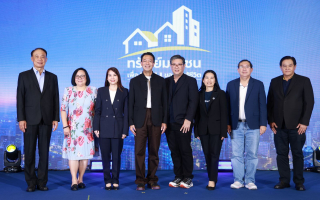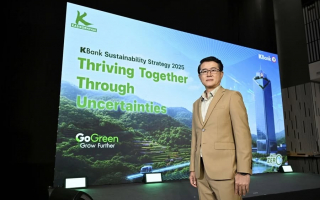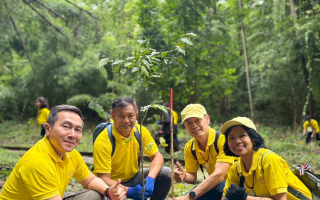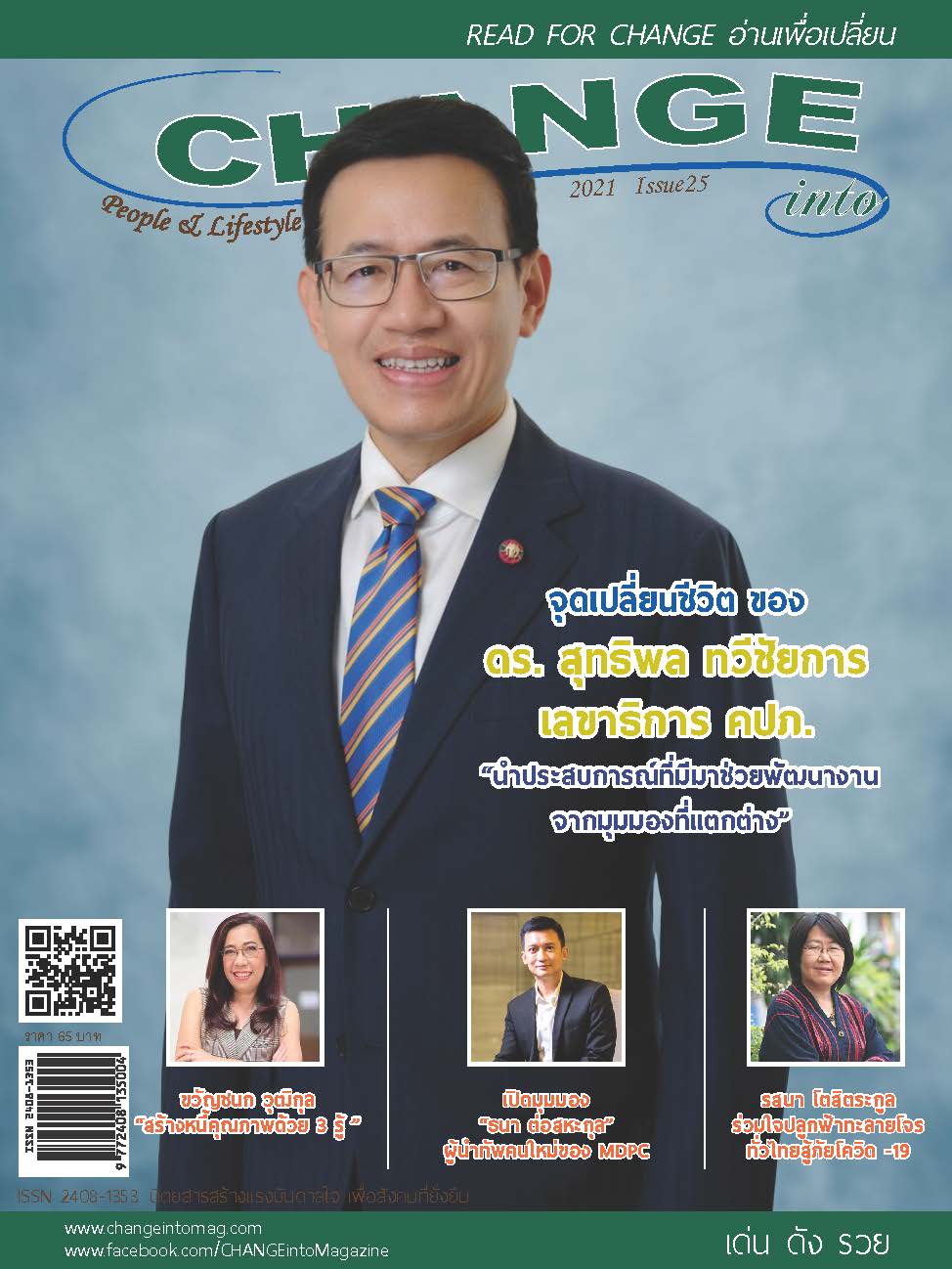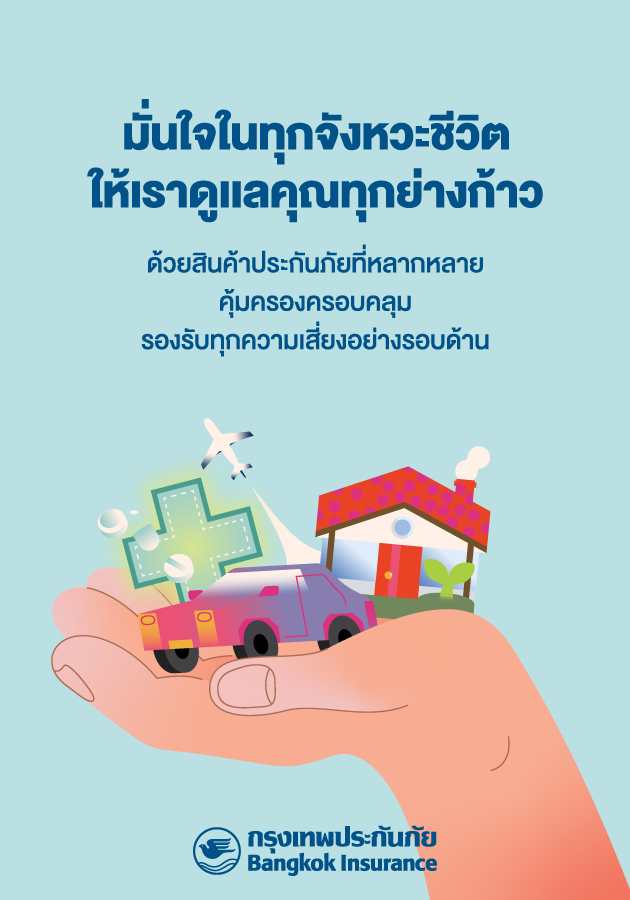กสิกรไทย เร่งเครื่องปรับยุทธศาสตร์ความยั่งยืน จาก "ESG-based Strategy"

กสิกรไทย เร่งเครื่องปรับยุทธศาสตร์ความยั่งยืน จาก "ESG-based Strategy" เป็น "Issue-based Strategy"
ธนาคารกสิกรไทยประกาศปรับยุทธศาสตร์ความยั่งยืน จากแกน ESG สู่การจัดการประเด็นสำคัญแบบองค์รวมเชื่อมโยงทุกด้านที่เกี่ยวข้อง กำหนด ความมุ่งหมายสำคัญเป็นแกนการจัดการ (Issue-based strategy) 3 เรื่อง ได้แก่ การเป็นธนาคารที่ทุกคนเชื่อมั่น การเสริมความยืดหยุ่นพร้อมก้าวสู่อนาคตร่วมกัน และการสร้างการเติบโตที่ครอบคลุมและทั่วถึง
เผยตัวอย่างผลลัพธ์การทำงานด้านความยั่งยืนที่สำคัญ ทั้งด้านการเสริมศักยภาพ การให้สินเชื่อที่มีคุณภาพและโซลูชันทางการเงินที่ครอบคลุม ควบคู่กับการส่งมอบองค์ความรู้และเครื่องมือจำเป็น ขับเคลื่อนโดยหลากหลายหน่วยธุรกิจที่ผสานความยั่งยืนในทุกการทำงาน รวมทั้งการผลักดันการลงทุนที่ยั่งยืน ผ่าน KAsset ด้วยกองทุน ESG Fund และ SRI Fund ที่มี AUM เป็นอันดับหนึ่ง
เร่งเครื่องเปลี่ยนผ่านด้านสภาพภูมิอากาศ ตามเป้าหมาย Net Zero Commitment ส่งมอบเม็ดเงินความยั่งยืนไปแล้วกว่า 173,000 ล้านบาท ช่วยลดการปล่อยก๊าซเรือนกระจกได้มากกว่า 2.74 ล้านตันคาร์บอนไดออกไซด์เทียบเท่า พร้อมปรับเพิ่มเป้าหมายการให้สินเชื่อและเงินลงทุนเพื่อความยั่งยืนกว่าสองเท่า เป็น 4-5 แสนล้านบาท ภายในปี 2573 (ค.ศ.2030) และตั้งเป้าหมายที่จะเป็น "The Most Comprehensive Climate Solution Provider – ผู้ให้บริการโซลูชันด้านสภาพภูมิอากาศที่ครอบคลุมที่สุด”
นายจงรัก รัตนเพียร ผู้จัดการใหญ่ ธนาคารกสิกรไทย เปิดเผยว่า ความท้าทายที่ประเทศไทยกำลังเผชิญ มีทั้งปัจจัยภายในประเทศที่เป็นปัญหาเชิงโครงสร้างซึ่งส่งผลต่อศักยภาพในการแข่งขัน อาทิ หนี้สาธารณะและหนี้ครัวเรือนที่ยังอยู่ในระดับสูง ความขัดแย้งด้านภูมิรัฐศาสตร์และสงครามการค้า การเปลี่ยนแปลงด้านสภาพภูมิอากาศ ซึ่งรวมถึงมาตรการทางการค้าจากประเทศคู่ค้าสำคัญ อาทิ EU CBAM ที่จะเริ่มเก็บค่าธรรมเนียมคาร์บอนตั้งแต่ปี 2569 เป็นต้นไป ที่คาดว่าจะส่งผลกระทบต่อการส่งออกของไทยเพิ่มมากขึ้น จากปัจจุบันครอบคลุมมูลค่าสินค้า 1.1 หมื่นล้านบาท เป็นราว 2.8 หมื่นล้านบาท ภายในปี 2573 ดังนั้นธุรกิจที่ปรับตัวได้ก่อนจะสร้างความได้เปรียบ
จากการประเมินปัจจัยรอบด้านที่เกิดขึ้น ธนาคารได้ทบทวนกลยุทธ์การทำงานด้านความยั่งยืน เพื่อช่วยให้ธนาคารสามารถรับมือกับความเปลี่ยนแปลงได้เร็วขึ้น ตอบสนองต่อความต้องการของลูกค้าและสังคมได้ชัดเจนขึ้น จึงเปลี่ยนจากการดำเนินงานความยั่งยืนด้วยแกนสิ่งแวดล้อม สังคม และธรรมาภิบาล (ESG-based Strategy) ไปสู่ยุทธศาสตร์ความยั่งยืนบนแนวทางใหม่ที่เน้นการจัดการประเด็นสำคัญแบบองค์รวม เชื่อมโยงมุมมองทุกด้านที่เกี่ยวข้อง กำหนดความมุ่งหมายชูเป็นแกนกลางของการทำงาน (Issue-based Strategy)
๐ ยุทธศาสตร์ความยั่งยืนแนวคิดใหม่แบบองค์รวม (Issue-based Strategy)
ด้วยความมุ่งมั่นที่จะพาทุกภาคส่วนเดินหน้าฝ่าคลื่นความท้าทายและเติบโตอย่างยั่งยืนไปด้วยกัน ยุทธศาสตร์ความยั่งยืนธนาคารกสิกรไทย 2568 ถูกออกแบบบนแนวคิด Issue-based Strategy ที่เน้นการจัดการประเด็นสำคัญแบบองค์รวม เชื่อมโยงทุกมิติทั้งสิ่งแวดล้อม สังคม และธรรมาภิบาล กำหนดเป็นความมุ่งหมาย ที่ธนาคารมุ่งเน้นส่งมอบให้แก่ผู้มีส่วนได้เสียทุกฝ่าย 3 เรื่องหลัก ได้แก่
1.การเป็นธนาคารที่ทุกคนเชื่อมั่น (Be a Most Trusted Bank) มุ่งเป็นธนาคารที่ทุกคนเชื่อมั่น พร้อมเคียงข้างผู้มีส่วนได้เสียในการก้าวผ่านความท้าทายเพื่อสร้างการเติบโตที่อย่างยั่งยืน ผ่านการบริการลูกค้า การกำกับดูแลกิจการ และการยึดมั่นในหลักจริยธรรม
2.การเสริมความยืดหยุ่นพร้อมก้าวสู่อนาคตร่วมกัน (Reinforce Future-Ready Resilience) เสริมความยืดหยุ่นให้องค์กรและผู้มีส่วนได้เสีย เพื่อพร้อมรับมือกับทุกความไม่แน่นอน และร่วมก้าวสู่โอกาสการเติบโตใหม่ ๆ ในอนาคต ผ่านการบริหารความเสี่ยง การสร้างนวัตกรรม และการพัฒนาขีดความสามารถ
3.การสร้างการเติบโตที่ครอบคลุมและทั่วถึง (Enable Inclusive Growth) ส่งมอบพลังให้ผู้มีส่วนได้เสียเข้าถึงศักยภาพสูงสุดผ่านผลิตภัณฑ์และบริการทางการเงินที่ครอบคลุมและทั่วถึง ผ่านการขับเคลื่อนการเปลี่ยนผ่านสู่เศรษฐกิจคาร์บอนต่ำอย่างทั่วถึง การให้ความรู้และสร้างการเข้าถึงบริการทางการเงินที่ช่วยเสริมสร้างศักยภาพ และการสร้างความเสมอภาคทางการเงิน
ภายใต้ยุทธศาสตร์นี้ได้ส่งเสริมให้ธนาคารกสิกรไทยสามารถขับเคลื่อนการเติบโตควบคู่กับการผสานมิติความยั่งยืนไปด้วยอย่างกลมกลืนในทุกการทำงาน มองเห็นโอกาสการส่งมอบผลลัพธ์เชิงบวกในหลากหลายมิติมากยิ่งขึ้น
สำหรับ 2 ตัวอย่างการทำงานของธนาคารที่ส่งมอบผลกระทบเชิงบวก
1. การส่งเสริมศักยภาพเพื่อสร้างความยืดหยุ่นและความแข็งแกร่ง (Strengthening Capabilities to Enhance Resilience)
ธนาคารไม่ได้เป็นเพียงผู้ให้สินเชื่อหรือบริการทางการเงิน แต่ยังเป็นผู้เสริมสร้างศักยภาพเพื่อให้ลูกค้า ธุรกิจ และสังคมมีความยืดหยุ่นและแข็งแกร่ง ด้วยการส่งมอบโซลูชันทางการเงินที่ครอบคลุม ควบคู่กับการให้องค์ความรู้และเครื่องมือที่จำเป็นต่อการเติบโตอย่างยั่งยืน
๐ การส่งมอบโซลูชันทางการเงินที่ครอบคลุม ผ่านการปฏิรูปกระบวนการเครดิตอย่างครบวงจร บนการบริหารจัดการความเสี่ยงเชิงรุก ควบคู่กับการผสานเทคโนโลยี Data & AI ส่งมอบสินเชื่อที่มีคุณภาพและสอดคล้องกับศักยภาพของผู้รับ มีสินเชื่อผู้ประกอบการขนาดกลางขึ้นไป และ Project Finance ผ่านการประเมินความเสี่ยงด้าน ESG ครบ 100% และเพิ่มเป้าหมายสินเชื่อและเงินลงทุนเพื่อความยั่งยืนเป็น 4-5 แสนล้านบาท ภายในปี 2573 (ค.ศ.2030) มีการส่งมอบโซลูชันการเงินที่ครอบคลุมลูกค้าทุกกลุ่มในหลากหลายรูปแบบ อาทิ การสร้างการเข้าถึงสินเชื่อบุคคลให้แก่ลูกค้าสินเชื่อรายเล็กผ่าน KIV การส่งเสริมการใช้รถยนต์ไฟฟ้าที่เป็นมิตรต่อสิ่งแวดล้อมผ่าน KLeasing และการสนับสนุนภาคอุตสาหกรรมให้เปลี่ยนผ่านสู่การใช้พลังงานทางเลือกผ่านโซลูชันเพื่อธุรกิจโดย KF&E ตลอดจนการเสริมสร้างการลงทุนที่ยั่งยืนผ่าน KAsset ที่เพิ่มโอกาสการลงทุนในธุรกิจที่ขับเคลื่อนบนหลักการ ESG โดยปัจจุบัน KAsset ครองส่วนแบ่งการตลาดเป็นอันดับ 1 ของประเทศใน ESG Fund และ SRI Fund ด้วยมูลค่าสินทรัพย์รวมภายใต้การจัดการ (AUM) กว่า 3.89 หมื่นล้านบาท และ 3.79 หมื่นล้านบาท ตามลำดับ รวมทั้งมี Beacon Impact Fund ที่มุ่งเน้นการลงทุนในบริษัทสตาร์ทอัพที่สร้างผลกระทบเชิงบวก
๐ การให้ความรู้และการมอบเครื่องมือที่มากกว่าการเงิน ผ่านการดำเนินโครงการให้ความรู้ทางการเงิน ธุรกิจ และการผสานแนวคิดด้าน ESG เข้าไปในทุกจุด ทั้งการให้ความรู้ทางการเงินและไซเบอร์แก่ลูกค้าและสาธารณะผ่านแคมเปญ “สติ” ที่สามารถสร้างการรับรู้แก่ลูกค้าและประชาชนไปแล้วกว่า 16.4 ล้านราย การเผยแพร่บทความด้านเศรษฐกิจ ธุรกิจ และแนวโน้มความยั่งยืนที่ทันต่อสถานการณ์โดยศูนย์วิจัยกสิกรไทยที่เข้าถึงผู้อ่านกว่า 6.58 ล้านราย การให้ความรู้แก่ผู้ประกอบการเอสเอ็มอีผ่านโครงการ K SME Care และช่องทางต่างๆ รองรับผู้ประกอบการกว่า 1.8 ล้านราย การให้ความรู้การลงทุนภายใต้แบรนด์ K Wealth ที่มีการพัฒนาองค์ความรู้ผ่านความร่วมมือพันธมิตรระดับโลก รวมทั้งเทรนด์การลงทุน ESG มีผู้สนใจเข้าถึงข้อมูลผ่านเว็บไซต์กว่า 1.68 ล้านเพจวิว และมีการรับชมคลิปบนยูทูปกว่า 11.19 ล้านวิว อีกทั้งโครงการ SKILLKAMP ที่พัฒนาทักษะและศักยภาพด้านดิจิทัลแห่งอนาคต สำหรับนิสิต นักศึกษาและบุคคลทั่วไป และช่วยให้ผู้ประกอบการธุรกิจสามารถเข้าถึงบุคลากรตรงกับความต้องการ ปัจจุบันมีคอร์สเผยแพร่ 355 คอร์สและมีผู้ลงทะเบียน 8,000 ราย และการส่งเสริมความรู้และเครือข่ายให้แก่สตาร์ทอัพผ่านโครงการ KATALYST โดยมีสตาร์ทอัพผ่านการเรียนรู้ในโปรแกรมแล้วจำนวน 155 ราย
2. การเร่งเครื่องการเปลี่ยนผ่านด้านสภาพภูมิอากาศ เพื่อส่งมอบอนาคตที่ยั่งยืน (Accelerating Climate Transition to Secure a Sustainable Future)
ธนาคารกสิกรไทย ได้ประกาศเจตนารมณ์สู่ Net Zero มาตั้งแต่ปี 2564 และตั้งเป้าหมายที่จะเป็น "The Most Comprehensive Climate Solution Provider – ผู้ให้บริการโซลูชันด้านสภาพภูมิอากาศที่ครอบคลุมที่สุด” ก้าวไป “เหนือกว่าการให้การสนับสนุนทางการเงิน” (Moving beyond finance) เพื่อช่วยสร้างขีดความสามารถในการแข่งขันที่จำเป็นให้กับลูกค้า
การขับเคลื่อนธนาคารบนพันธกิจสู่ Net Zero สร้างผลลัพธ์การเปลี่ยนแปลงอย่างต่อเนื่อง ดังนี้
๐ การลดการปล่อยก๊าซเรือนกระจกจากการดำเนินงานของธนาคาร เพื่อไปสู่เป้าหมาย Net Zero จากการดำเนินงานของธนาคารภายในปี 2573 (ค.ศ.2030) โดยในปี 2567 ธนาคารสามารถลดการปล่อยก๊าซเรือนกระจกได้ถึง 17.02% เมื่อเทียบกับปีฐาน 2563 (ค.ศ.2020) จากการดำเนินโครงการต่างๆ เช่น การติดตั้งโซลาร์รูฟครบทุกอาคารหลัก และสาขาอีก 161 แห่ง พร้อมใช้รถยนต์ไฟฟ้าแล้วกว่า 354 คัน รวมทั้งได้รับการรับรองว่าเป็นองค์กรที่เป็นกลางทางคาร์บอนต่อเนื่องถึง 8 ปี (ปี 2561-2568)
๐ การผลักดันให้พอร์ตโฟลิโอของธนาคารบรรลุเป้าหมาย Net Zero ตามกรอบที่ประเทศไทยกำหนดสอดคล้องกับเป้าหมาย NDC (Nationally Determined Contribution) และเร่งดำเนินการในส่วนที่สามารถทำได้ให้เร็วที่สุดเท่าที่จะเป็นไปได้ โดยธนาคารได้วางแผน กลยุทธ์รายอุตสาหกรรม (Sector Decarbonization Strategy) เพื่อเข้าไปควบคุมและสนับสนุนการเปลี่ยนผ่านอย่างใกล้ชิด จำนวน 6 กลุ่มอุตสาหกรรม ได้แก่ กลุ่มโรงไฟฟ้า กลุ่มน้ำมันและก๊าซธรรมชาติต้นน้ำ กลุ่มเหมืองถ่านหินประเภทเชื้อเพลิงให้ความร้อน กลุ่มซีเมนต์ กลุ่มอลูมิเนียม และกลุ่มยานยนต์ โดยพอร์ตโฟลิโออุตสาหกรรมโรงไฟฟ้ามีระดับความเข้มข้นของการปล่อยก๊าซเรือนกระจก (Emission Intensity per GWh) ลดลง 26% ในปี 2567 เมื่อเทียบกับปีฐาน 2563 (ค.ศ.2020)
๐ การสนับสนุนให้ลูกค้าสามารถเปลี่ยนผ่านสู่ธุรกิจคาร์บอนต่ำ ด้วยการสนับสนุนทั้งด้านการเงิน ความรู้ และเทคโนโลยี ผ่านการปล่อยสินเชื่อและการลงทุน โดยมียอดสะสมของสินเชื่อและการลงทุนเพื่อความยั่งยืนกว่า 173,231 ล้านบาท (ณ สิงหาคม 2568) และสามารถช่วยลดการปล่อยก๊าซเรือนกระจกได้มากกว่า 2.74 ล้านตันคาร์บอนไดออกไซด์เทียบเท่า ประกอบด้วยสินเชื่อรถยนต์ไฟฟ้ากว่า 39,000 คัน สินเชื่อเพื่ออาคารสีเขียวมากกว่า 1 ล้านตารางเมตร สินเชื่อสำหรับโครงการทางธุรกิจเพื่อความยั่งยืนกว่า 500 โครงการ รวมถึงการดำเนินงานในมิติ Beyond Banking
ธนาคารได้ปรับเป้าหมายสินเชื่อและเงินลงทุนเพื่อความยั่งยืน เป็น 4-5 แสนล้านบาท ภายในปี 2573 (ค.ศ.2030) เพื่อเร่งการเปลี่ยนผ่านสู่เศรษฐกิจคาร์บอนต่ำอย่างมีประสิทธิภาพ ตลอดจนมุ่งมั่นพัฒนา Beyond Banking Solution เพื่อส่งมอบ Climate Solution ที่จะช่วยเสริมสร้างศักยภาพให้แก่ลูกค้า และส่งเสริมการสร้าง Carbon Ecosystem ที่ครอบคลุมทุกมิติของการแก้ไขปัญหาสภาพภูมิอากาศ ได้แก่ การเป็นที่ปรึกษาด้านความยั่งยืนและการลดการปล่อยก๊าซเรือนกระจกสำหรับภาคธุรกิจที่ต้องการปรับตัว พร้อมพัฒนาเครื่องมือ KClimate1.5 สำหรับการจัดทำบัญชีก๊าซเรือนกระจก การจัดตั้ง Creative Climate Research Center เป็นศูนย์กลางองค์ความรู้และความร่วมมือเพื่อรับมือกับปัญหาโลกร้อน การริเริ่มโครงการต่างๆ เพื่อสร้าง Carbon Ecosystem ในสังคม เช่น Watt’s Up แพลตฟอร์มสำหรับรถมอเตอร์ไซค์ไฟฟ้า แพลตฟอร์ม Green Pass สำหรับการขอใบรับรอง RECs และแพลตฟอร์ม K-GreenSpace ที่ช่วยให้ลูกค้าเข้าถึงโซลูชัน Green Living ได้ง่ายขึ้น
นอกจากนี้ ธนาคารเชื่อมั่นว่าการขับเคลื่อนธุรกิจไทยสู่เศรษฐกิจคาร์บอนต่ำต้องอาศัยความร่วมมือจากทุกภาคส่วน จึงร่วมกับพันธมิตรจากภาคเอกชน ภาครัฐ ภาคการเงิน และภาควิชาการ จัดตั้ง “เครือข่ายธุรกิจเพื่อการจัดการสภาพภูมิอากาศประเทศไทย” (Thailand Climate Business Network: Thai CBN) ซึ่งมีสมาชิกกว่า 34 องค์กร ร่วมกันผลักดันแนวปฏิบัติด้าน Climate ที่นำไปใช้ได้จริง ตั้งแต่ระดับ SME จนถึงข้อเสนอเชิงนโยบายระดับประเทศ โดยเครือข่าย Thai CBN ได้จัดทำ E-Handbook for Greener SMEs และ White Paper - Climate Ecosystem Collaboration เพื่อส่งมอบให้ภาครัฐ ถือเป็นจุดเริ่มต้นของการสร้างพลังร่วมระหว่างภาคธุรกิจและภาครัฐในการเร่งการเปลี่ยนผ่านของประเทศอย่างยั่งยืนและมีส่วนร่วม
นายจงรักกล่าวตอนท้ายว่า ธนาคารกสิกรไทยดำเนินธุรกิจบนหลักการธนาคารแห่งความยั่งยืนมาอย่างต่อเนื่อง มีการบูรณาการยุทธศาสตร์ความยั่งยืนแบบองค์รวม สร้างผลกระทบเชิงบวกและวัดผลได้อย่างเป็นรูปธรรม และเน้นย้ำว่าในทุกพันธกิจที่ธนาคารขับเคลื่อนต้องอาศัยความร่วมมือจากทุกภาคส่วนที่เชื่อมโยงกันในระบบนิเวศ สร้างรากฐานที่ยืดหยุ่น แข็งแกร่ง และมีคุณภาพให้แก่ผู้มีส่วนได้เสียอย่างสมดุล เพื่อให้ทุกชีวิตและทุกธุรกิจเดินหน้าผ่านพ้นทุกความท้าทายไปด้วยกัน เติบโตต่อไปได้อีกอย่างมั่นคงและยั่งยืน
- KASIKORNBANK (KBank) is closely monitoring and addressing key national structural challenges, as well as external factors such as geopolitical tensions, trade wars, and the growing pressure from worsening climate crisis transmitted through trade measures, which are driving businesses to adapt towards a low-carbon economy.
- The Bank has announced a refinement of its sustainability strategy, shifting focus from the traditional ESG framework to a holistic issue-based strategy that integrates three key management priorities: Be a Most Trusted Bank, Reinforce Future-Ready Resilience, and Enable Inclusive Growth.
- Significant sustainability performance outcomes underscore KBank’s efforts in transforming credit capacities and expanding inclusive finance in tandem with the delivery of essential knowledge and tools, driven by various business units that integrate sustainability into every function. Additionally, the Bank actively promotes sustainable investing through KAsset, which holds the No. 1 ranking for asset under management (AUM) in the ESG Fund and SRI Fund categories.
- The Bank is accelerating its climate transition in line with its Net Zero Commitment. It has already delivered more than Baht 173 billion in sustainable finance and investment, which has helped reduce greenhouse gas emissions by more than 2.74 million tons of carbon dioxide equivalent (tCO2e). Simultaneously, the Bank has more than doubled its sustainable finance and investment to Baht 400–500 billion by 2030. Its overall ambition is to become "The Most Comprehensive Climate Solution Provider."
- Be a Most Trusted Bank: Serve as a most trusted bank, helping shareholders navigate challenges and achieve sustainable growth via customer service, governance and integrity.
- Reinforce Future-Ready Resilience: Future-ready ourselves and our stakeholders to better navigate uncertainties and unlock new growth opportunities through risk management, innovation, and capability development.
- Enable Inclusive Growth: Empower our stakeholders to achieve their full potential and drive sustainable growth through an inclusive transition to a low-carbon economy, financial empowerment and equity.


